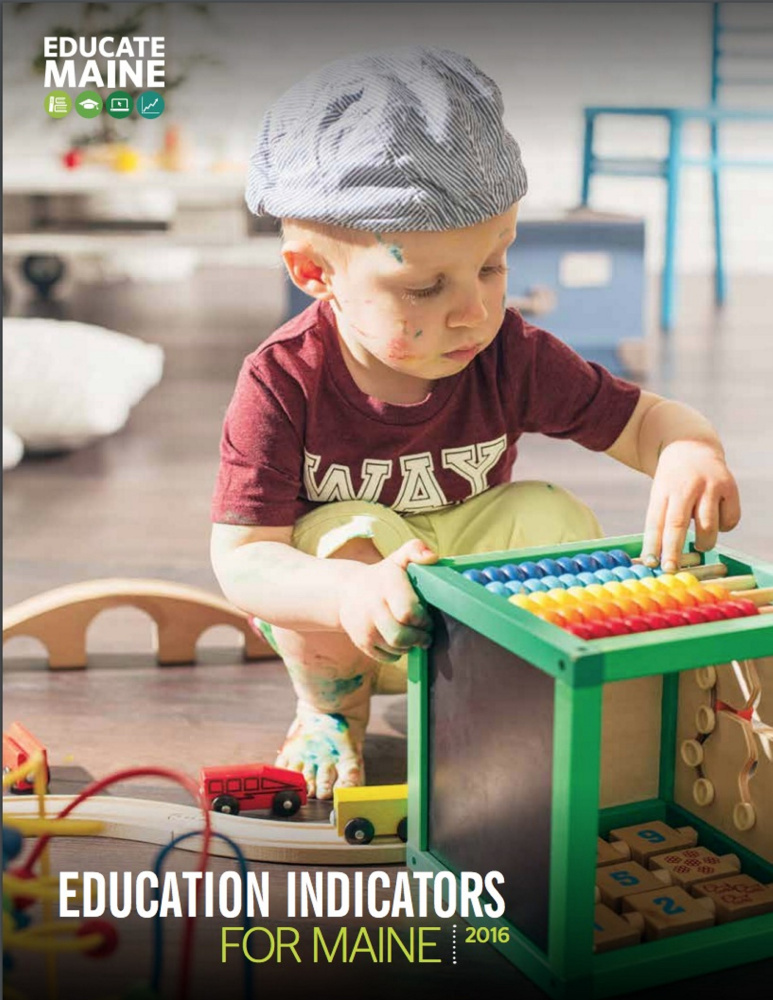Educate Maine, a business advocacy group tracking the health of Maine’s educational system, says that despite progress in early education, income inequality has continued to slow attempts to close student achievement gaps.
“Income is dictating equity and in too many instances people with low incomes are not receiving the educational equity that they deserve and that we, as a society, require,” said Chris Hall, CEO of the Portland Regional Chamber of Commerce.
Hall, a member of Educate Maine, was speaking about findings highlighted in the group’s fourth annual report released Tuesday. The report noted increased access to early childhood education across the state as well as Maine students’ ongoing struggle to achieve proficiency in math and reading.
The report, which provides a snapshot of Maine’s education system from pre-K through college across 10 indicators, showed that the state has taken significant steps to make early childhood education classes available to more students. Ed Cervone, Educate Maine’s executive director, attributed that progress to growing recognition in the state that early educational opportunities lay the foundation for future academic and professional success.
“If you’re not starting them early and starting them strong you can forget about everything down the road,” Cervone said. “I think that’s finally hitting home and we’re seeing the outcomes here.”
But despite wider availability, the report found that Mainers aren’t enrolling their children in preschool in high numbers. Only 45 percent of Maine’s 3 and 4-year-olds were enrolled in preschool this year compared with 47 percent of their counterparts across the U.S. and 58 percent in New England.
Those early educational gaps follow Maine children to higher grades. According to the report, only 36 percent of Maine’s fourth-graders were found to be proficient in reading while 41 percent were proficient in math. By eighth-grade the numbers dropped to 35 percent before rising to nearly 50 percent proficiency among high school students.
The report found that most of the students entering ninth grade in Maine graduated from high school and more than half of high school graduates enrolled in two- or four-year colleges. But only 31 percent of college enrollees graduated from their programs. The report attributed some of those retention problems to the cost of higher education and the fact that Maine college students were paying more of their per capita income than other New England students, despite having the most affordable public university tuition in New England.
Mainers’ incomes continued to lag behind those of other New England states last year and those economic issues are manifesting in classrooms with a sizeable achievement gap between Maine’s richest and poorest students. Maine students from families with incomes at or below 185 percent of the poverty level ($44,995 for a family of four) scored lower on proficiency exams throughout their academic careers with 20-28 point differences on fourth- and eighth-grade math and reading exams, according to the report. Those patterns persist as lower income students graduate from high school at lower rates, enroll in college at nearly half the rate of their wealthier peers and graduate from college at less than half the rate of higher income students.
Cervone says if Maine wants to improve its economic outlook it must do more to close the low-income achievement gap. He recommends more investment in Head Start, after school and summer programs that stem the learning losses many, and particularly low-income, students experience over the summer.
When it comes to funding those programs, however, Cervone is less clear. Educate Maine has come out against Maine’s Question 2 ballot referendum, which would raise taxes on incomes exceeding $200,000 by 3 percent with the intent of directing those funds to public education. Cervone points to Maine’s 2004 ballot referendum calling for the state to pay 55 percent of the costs for K-12 public education, and data showing that it has yet to meet that obligation, as an example of some of the problems that come with legislating complicated issues like school funding through yes or no ballot referenda.
“There’s not an argument as to whether the schools need the money or deserve the money,” Cervone said. “We just don’t believe that the mechanism provided (in Question 2) is going to get the money to the teachers and the schools and the kids who need it.”
Copy the Story Link
Send questions/comments to the editors.





Success. Please wait for the page to reload. If the page does not reload within 5 seconds, please refresh the page.
Enter your email and password to access comments.
Hi, to comment on stories you must . This profile is in addition to your subscription and website login.
Already have a commenting profile? .
Invalid username/password.
Please check your email to confirm and complete your registration.
Only subscribers are eligible to post comments. Please subscribe or login first for digital access. Here’s why.
Use the form below to reset your password. When you've submitted your account email, we will send an email with a reset code.